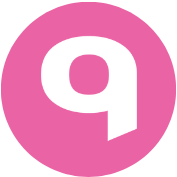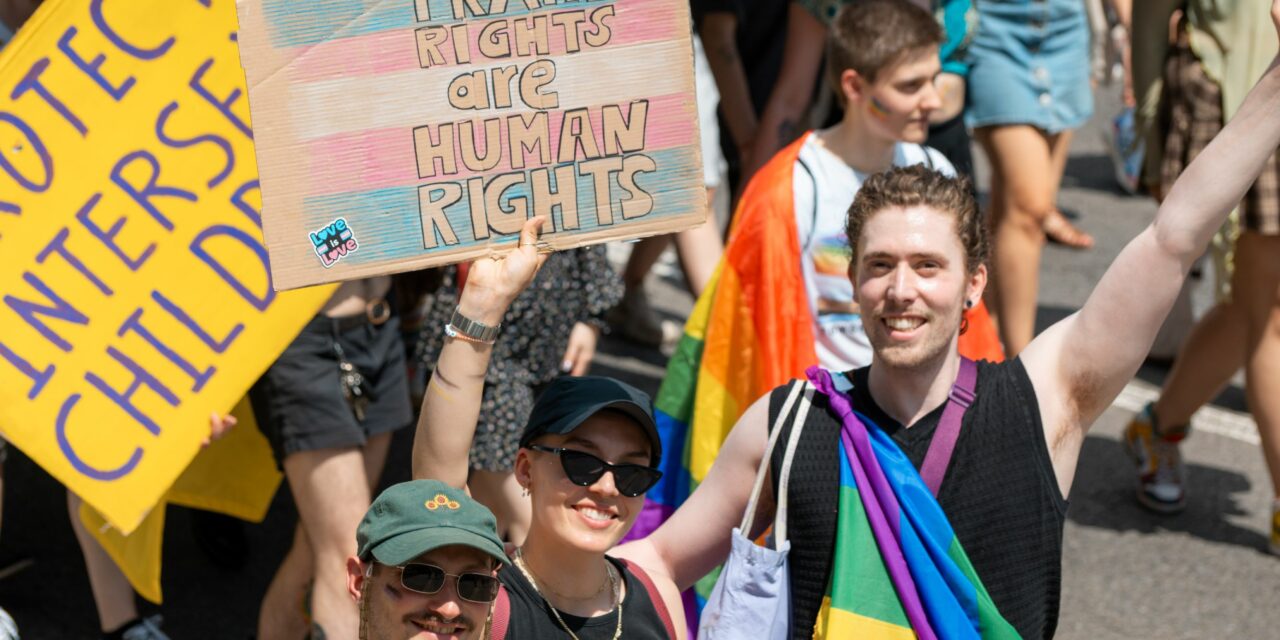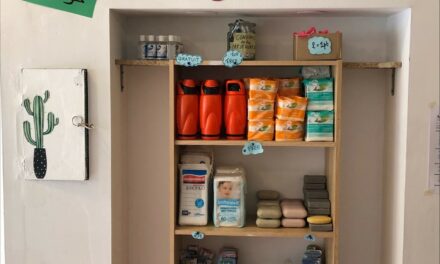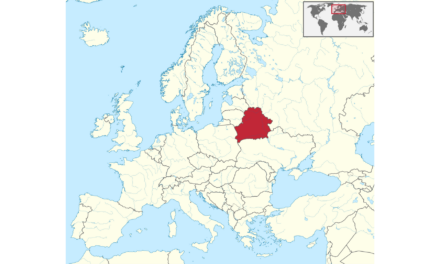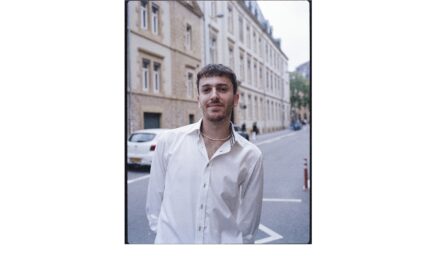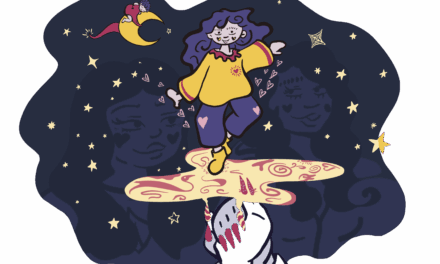When we speak of the LGBTIQ+ community, who do we imagine? The image evoked may strongly vary depending on who is asked. However, the diverging answers point towards an important observation: Maybe there is not one LGBTIQ+ community, but rather many different communities with their own unique experiences. Even though Luxembourg is a small country, our Grand Duchy is home to many different communities which, according to some of our interviewees, risk being hidden beyond one big rainbow. queer.lu set out to talk to some of these communities within the community to learn about collective solidarity in Luxembourg and comfort in small numbers.
Meeting community face to face
“It was a busy night. Everyone was so happy,” Benjamin describes the opening of his new bar Letz Boys last September. He estimates that around 300 people showed up to celebrate the opening of Luxembourg City’s new and only gay bar. Benjamin had been thinking for a long time about opening the bar. Once the pandemic had calmed down, he realized his dream and created a new place for the community to meet and have fun.
Before the opening of the bar, “we didn’t have a location to get all together, get a drink and have fun with friends,” explains Benjamin. Compared to other marginalized communities, it is a unique feature of the LGBTIQ+ community that members usually do not grow up among people who share the same experiences as they do. Throughout history, queer bars have long been an essential way for LGBTIQ+ people to find their community. As Luxembourg City’s last gay bar Bar Rouge closed in May 2021, Letz Boys sparked major excitement within the community.
Benjamin, who has been living in Luxembourg for the past seven years, knows that “we have one community with different subgroups inside” and these subgroups might not necessarily mix well. “I don’t know why,” notes Benjamin, who wants his place to be as inclusive as possible, but he also knows that “Paris, for example, has many different bars: one for lesbians, one for gays, and so on” which allows each “subgroup” to create spaces shaped to their own preferences.
While most buzz about the bar has been positive, Letz Boys has gotten some criticism by “subgroups” due to its name. “We wanted a name for the bar which you can understand in English, French and Luxembourgish. It wasn’t more complicated than that, but I see in hindsight that it seems very focused on gay men,” acknowledges Benjamin, “the bar is for all the community, we are not exclusively for gay men”. An aim for inclusivity is reflected in their event programming, as they have women-focused evenings in collaboration with Ladylike – Absolutely Queer and evenings in collaboration with the LGBT+ student association at the University of Luxembourg. Letz Boys regularly hosts the mobile STD testing team DIMPS by the HIV Berodung Croix-Rouge Luxembourgeoise.
Prioritizing everyone but cis men
While Letz Boys has an aim to remain open to everyone, not every LGBTIQ+-focused space in Luxembourg does so too. DJ Deng Mama (Luxembourgish for ‘Your Mother’) has been to queer parties in Luxembourg where she was not allowed to go in because she is a woman. She notes that she is missing openness in Luxembourg. Her new collective Gebees Houeren (Luxembourgish for ‘Jam Hoes’) wants to bring this openness to the local nightlife scene – FLINTA-focused but open to anyone who enjoys a safe clubbing experience. FLINTA stands for female, lesbian, intersex, trans and agender people. Deng Mama points out that “this project emerged out of a need for such spaces.” Gebees Houeren is a project which primarily organizes FLINTA-focused electronic music parties and has hosted seven temporary safer spaces since last summer.
Deng Mama had an event collective before Gebees Houeren which was not focused on FLINTA people, but she quickly noticed that “techno is so often connected to this somber, wuah! masculine vibe,” so she decided to take a different direction. “Not many women have a say in nightlife management. That’s why you often don’t feel comfortable when you’re booked as a female DJ. And there isn’t always 100% professionalism, especially because it’s nightlife.” This also reflects on the experiences of FLINTA people who go to the club for a fun night out. “So many young girls at the club – me included – have been taken advantage of. There is no one who watches out for them and there is zero education. It’s the Wild Wild West out there.” Deng Mama feels a responsibility to change these patterns and to create safer spaces.
“It’s good to say you’re a safe space, but I can’t claim yet that we are. We are still working with places, which have never heard about these concepts before,” regrets Deng Mama. To assure safety inside the club, a co-worker of the collective is at the door and she makes a selection based on how party-goers react to their rules. “She tells party-goers what our rules are. We explain to them who we are and how they have to behave. It’s human-to-human communication. We see right then how people react to these rules.” Deng Mama is shocked that people sometimes react so negatively to rules of safety in clubs. “So many men ridicule our rules. And then it’s clear, you can’t get in.” Selection is not based on sexuality, gender, looks or any other factors besides accepting their clubbing rules. These rules include: respecting each person’s personal space, upholding a clear consent culture and following a zero-tolerance policy for discriminatory behavior.It is not only about accepting the house rules at the door, but also about adhering to them inside. “If we notice something or someone makes us aware of someone, we will talk to the person and/ or kick them out depending on the situation.” In her experience, people take feedback when you explain the reasoning behind it. Deng Mama notes that “we prioritize education over exclusion. We usually first try to calmly talk to them. I don’t want to exclude people, but educate them”. The party organizers want to organize a clubbing experience which is inclusive and simultaneously creates change. Gebees Houeren also has Pipapo at each of their events, which is a resource co-financed by the Ministry of Health. Pipapo informs party-goers onsite about safer alcohol and drug use, consent and anti-discrimination. “I am so thankful that we have Pipapo. Shoutout to their important work!” Deng Mama also thanks her fellow Gebees Houeren Maryse, Juliana (K.leo.patra), Marie (Yoni), Mara and Mariana.
Deng Mama explains her own fascination for the techno scene because “every side of you is more accepted in these techno communities and you can get to know yourself better”. This acceptance has allowed her to experiment with her fashion as she has “always enjoyed wearing rather eccentric outfits” – and this has not only been her experience alone. “People have been super happy about our project. I also noticed that people started to experiment with their styles now too. This wasn’t the case at all at the first parties.” The upcoming goal of Gebees Houeren is to create a community outside of solely nightlife and they will soon launch open calls for collaborations. Noé, who uses he and they in alteration, has found their community abroad exactly through such FLINTA-focused spaces. Hearing about this project, they were excited to see change happening in Luxembourg.
Looking for a community abroad
Noé Duboutay is a 28-year-old artist who grew up in Luxembourg, but has lived most of his adulthood in Zurich and since September of last year in Berlin. “Here in Berlin, I surround myself with genderqueer people and we mostly hang out in FLINTA or trans spaces. I mean, we have a little more queer spaces here in Berlin than in Luxembourg,” explains Noé with a laugh, “it feels so good to be among people to whom you don’t have to explain your identity”.
Noé underlines that queer spaces in Zurich not only gave him comfort, but explicit celebration. They were not out yet in Luxembourg and continued their art degree in Zurich after high school and a bachelor in Saarbrücken. “I already knew some queer people beforehand, but I went to a drag workshop in Zurich and it was the very first time I was in a space with only genderqueer people.” Noé explains how there were many different outfits, packers (material to put into your crotch to imitate a bulge) and binders (a tight clothing piece used to flatten the chest) at that workshop and “there was no shame. You were celebrated for trying out something new and for experimenting”. He regrets that many queer people “don’t get this celebration from the outside world, so it’s really important to experience this within the community.”
Nevertheless, to be part of a community also comes along with certain expectations. Noé felt some internal pressure to visibly look trans “at the beginning when I came out. This was also because I wasn’t sure at that time how far I wanted to transition”. He was questioning if he wanted to transition “because of these expectations that come along with someone coming out as trans or because it was my own wish”. Finding a caring community, which then allowed shame-free experimentation, helped them to move beyond this anxiety.
This first workshop allowed Noé to find a queer community by entering the drag scene in Zurich. “You find community when it’s not only about identity, but also interests,” they explain, “people sometimes think that we all share the same opinions, but that’s not the case. And I also don’t think everyone who identifies as queer should talk about all queer experiences,” asserts Noé. It is important to show solidarity in a political context and to organize together, according to him, but people have to also stay conscious about injustices within the community.
It is not only about simple awareness, but “people should carefully consider these different privileges before acting. This is mostly for organizers. For example, they promote a queer party but then the event only caters to gay cis men. They didn’t actively create space for other queer people”. Noé says that an awareness team and a focus on FLINTA artists can help create spaces which consider the active inclusion of FLINTA people – mirroring the practices of the Gebees Houeren.
“In the last few years, I have gotten to know more and more queer people in Luxembourg. And it feels so nice to see the place you’re from in a different light,” notes the artist about their relationship to their home country. “It’s nice to know that I am not an oddity here”, but that there are like-minded people in Luxembourg. “At the same time, there are a lot of memories that come back” when Noé visits, “you remember your past self, but you’re also the person you’re now. So, it’s a weird mix of emotions”. Noé experienced abroad how it feels to live an “authentically queer life, which you couldn’t have experienced here in Luxembourg,” and, now when he comes back home, he says he has much more courage to live the life he wants to here too.
Noé advises other people who are looking for a community to check online. He found a community for himself through his drag and by joining FLINTA sport groups, but he also recommends attending meeting groups. Several associations in Luxembourg offer meeting groups, such as the Centre LGBTIQ+ CIGALE, Rosa Lëtzebuerg and Intersex & Transgender Luxembourg a.s.b.l. Meeting groups are get-togethers of specific communities of people, ranging from fun hangouts to emotional support groups. You can find a list of all LGBTIQ+ meeting groups on queer.lu.
Communities know themselves best
The Centre LGBTIQ+ CIGALE gives one clear example of how these meeting groups foster community. They currently host ten different meeting groups – ranging from its biggest meeting group, the rainbow family group with over 100 members, to its currently smallest group, the asexuality meetups. “Our full name is The Center of Lesbian, Gay, Bisexual, Trans, Intersex and Queer+ communities. Since the foundation of our center in 2002, we have approached LGBTIQ+ people as coming from multiple communities,” says Didier Schneider, the director of the CIGALE. The CIGALE’s work is based on peer-to-peer support, empowerment, education and community building, but also on “offering people a space to experiment with different ways of going through life,” explains Didier.
The CIGALE defines community as “a group of people who fundamentally share one or several goals”. Looking back into history, Didier explains that homosexuals might have had similar goals within the gay liberation movement in the past as they fought for their existential rights, “but nowadays, our society has evolved a lot and all our interests aren’t aligned anymore. For example, if you take me: I am 50-year-old, I am married and I have a child. I want to fit in, I want to simply be included in our society. And if you then take someone else: a 20-year-old trans person who has to fight for their rights, who experiences harsh discrimination and who might also live in poverty,” compares Didier, “where do their interests or needs overlap? It’s just an example, but lived experiences among LGBTIQ+ people are often vastly different”. These differences require different approaches to each meeting group hosted by the CIGALE – and this is achieved by involving the members themselves.
Most of these groups have autonomously formed themselves as members of the specific communities asked to be hosted at the CIGALE. Other groups, such as the queer refugee group, were established by their team. Didier highlights that “we don’t speak for these groups, they speak for themselves. We want to reduce the top-down dynamic as much as possible”. Independent of how the meeting group was established, the CIGALE wants to encourage autonomy and self-determination. In practical terms, this means that each group is led by a coordinator from within the specific community and this coordinator has a reserved spot on the board of the CIGALE. Depending on the specific group, the CIGALE’s five part-time employees help the coordinator more or less with their tasks, as the coordinators work on a volunteer basis. By being on the board, every coordinator has a say in the general direction of the CIGALE’s agenda, and Didier, as the director of the association, has to report and justify the center’s activities to them. Their approach seems to be clearly related to Noé’s personal opinion on the matter.
Didier emphasizes that, while there are different communities, “we need to unite these different communities in order to gain the best political leverage. LGBTIQ+ people are not all part of the same community by definition, but we should come together to push for specific laws and policies to be changed even if it doesn’t directly affect you”. He highlights that this idea of convergence becomes apparent through their umbrella meeting group, the Uniqueers. “It is where everyone comes together and gets to meet each other through fun activities. This universal community doesn’t exist per se following our definition, but we make it exist by bringing all these communities together. Nous pensons la communauté LGBTIQ+ comme une fiction politique nécessaire”. Going back to the example mentioned earlier, “if you tell a 20-year-old that she is part of the same community as a 60-year-old gay guy, she may disagree – but if you acknowledge their differences, you may find a common ground among both and create new synergies”.
The success of the CIGALE’s approach can be illustrated by an example. Didier recounts that one trans woman approached their team for support. As she could not express her womanhood at home because she was not out yet to her children and spouse, “she met with one of our social workers. After a few meetings, she said that she was ready to try out presenting herself a little more womanly”. After some more meetings with the social worker, “she said that she was ready to come out in public with her new look”. She first joined the Lilies, which is a meeting group for people who come out later in life, and she eventually joined the Uniqueers. “There were 70 people at the Uniqueers meetup that day – not only from the Lilies or trans people, but everyone. She told us it was the most beautiful day of her life. Now, in the company of Lilies group members, she is walking outside and is going to restaurants. The Lilies community tries to make it as safe and comfortable as possible for her.” She found her community at the CIGALE.
CIGALE’s meeting groups are also in contact with meeting groups hosted by Rosa Lëtzebuerg and the Rainbow Center. As the oldest LGBTIQ+ association in Luxembourg, Rosa is the organizer of Luxembourg’s annual Pride Week, hosts several socio-cultural events and runs the Rainbow Center, the Center for Queer Culture in the Grand Duchy and the Greater Region, with government funding from the Ministry of Gender Equality and Diversity. The Rainbow Center was inaugurated in 2023 and is home to the queer.lu magazine. Similar to the CIGALE, all of Rosa’s meeting groups function on the basis of autodetermination.
Attendees of meeting groups have been, however, confused about the offers at CIGALE and Rosa. For example, Rosa has been hosting a meeting group for religious LGBTIQ+ people since 2009. CIGALE started its own this year, on request of their members. Andy Maar, member of Rosa’s board, noted that some of the members of Rosa’s religious meeting group were confused what the foundation of CIGALE’s group would mean for theirs. This is why CIGALE and Rosa got together last March to discuss how to best compliment their offers. In conclusion, both parties agreed that CIGALE’s meeting groups focus on what could be summarized as the socio-pedagogical, e.g. peer-to-peer support and education. Rosa’s offer focuses on the political and the socio-cultural, e.g. political commissions and fun get-togethers. Both organizations also aim to redirect people to each other depending on what community members are looking for.
Representing Pride
Creating these synergies between different organizations and community groups is also a key mission of Rosa when organizing Pride. “The first Pride in Luxembourg only had activities organized by Rosa. Last Pride, we had 24 different events organized by partners,” explains Andy. Any organizer can contact Rosa and request to be part of the official Pride programs. “We want these events to not only happen in parallel, but together.” This is especially important to Andy as he knows that there are different communities under the LGBTIQ+ umbrella and their dedicated team of all volunteers strive to bring Luxembourg’s flourishing community together. “The more these different communities work together, the better the exchange between them becomes,” says Andy, echoing the CIGALE‘s professed mission statement towards the community.
While Rosa is conscious of the different community dynamics in Luxembourg, Andy highlights another significant aspect: language. While Rosa’s team and the Rainbow Center actively promote events in German, French, and English to engage the diverse residents of the Grand Duchy, there are occasional challenges. For instance, Andy shares an anecdote: “We recently organized a ‘Kaffi a Kuch’ (coffee and cake) meet-up, primarily promoted in English, which surprisingly mostly attracted expats.” Over the years, Rosa has received feedback from longtime members suggesting that French and Luxembourgish are more accessible to them. When addressing community dynamics in Luxembourg, it’s crucial to consider the role of language.
As an association but also as organizers of Pride, Andy points out that Rosa has always had an open door policy at the Rainbow Center and an open email inbox for anyone who wants to get involved – “so that no one feels left out”. He explains that it is difficult to represent everyone’s community or sub-group if people from within these communities do not get involved themselves. In the past, Rosa has faced criticism for being perceived as a “white cis gay organization”. However, Andy emphasizes that this perception does not hold true. He points to the diverse composition of the board, the Pink Ladies group within Rosa as well as the increasing presence of intersex and trans individuals. While many of these members prefer to maintain their privacy, they actively participate in the meeting groups held at the Rainbow Center. He insists that Rosa‘s main goal is to foster diversity and inclusivity through the Rainbow Center‘s expanded programming throughout the year, stating, “now that we have a space to gather, it’s essential that we make full use of it!” If you’re interested in organizing an LGBTIQ+-related event, don’t hesitate to reach out to the Rainbow Center for assistance.
Community work is work
queer.lu reached out to the Intersex & Transgender Luxembourg a.s.b.l., the ITGL, to hear about their stance on the community dynamics in Luxembourg. While the ITGL was excited about the topic, they sadly were unable to respond due to limited resources at the time. The ITGL offers peer-to-peer support, support for relatives, sensitization work, workplace training and does political lobbying.
Activists and community members often encounter this recurring challenge of insufficient resources and lacking financial support. The administrative tasks for Gebees Houeren are entirely carried out voluntarily by its team, and the same applies to group coordinators at the CIGALE. Similarly, the board members of Rosa Lëtzebuerg as well as all their over 30 volunteers dedicate their time voluntarily and so does the team at ITGL.
Beyond the rainbow
Luxembourg has a diverse tapestry of different LGBTIQ+ communities which seem to come together for different reasons and in different spaces. While not all LGBTIQ+ people see themselves as part of a community, as some people have told queer.lu during our background research, others strongly rely on their peers to find comfort or to simply have a good time. It is noticeable that there are several meeting groups in Luxembourg with similar community focus. While all meeting groups work with full auto-determination of the participants, some have a focus on fun get-togethers and others rather on peer-to-peer support. Andy Maar believes there is “a new sense of excitement within the community” due to the many new or better communicated offers available in our small Grand Duchy. While LGBTIQ+ people navigate between open political solidarity and discreet comfort, all interviewees agree that progress is still needed and a strong community is a first step to prompt this change.
Photo: Pit Reding
